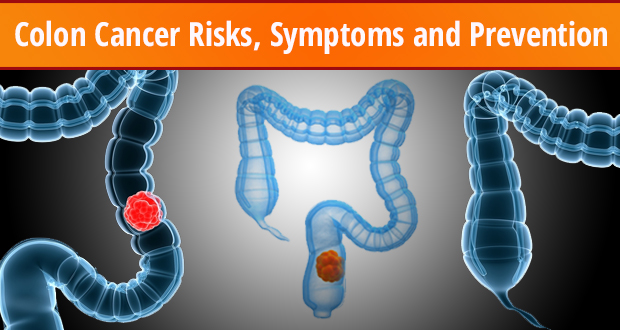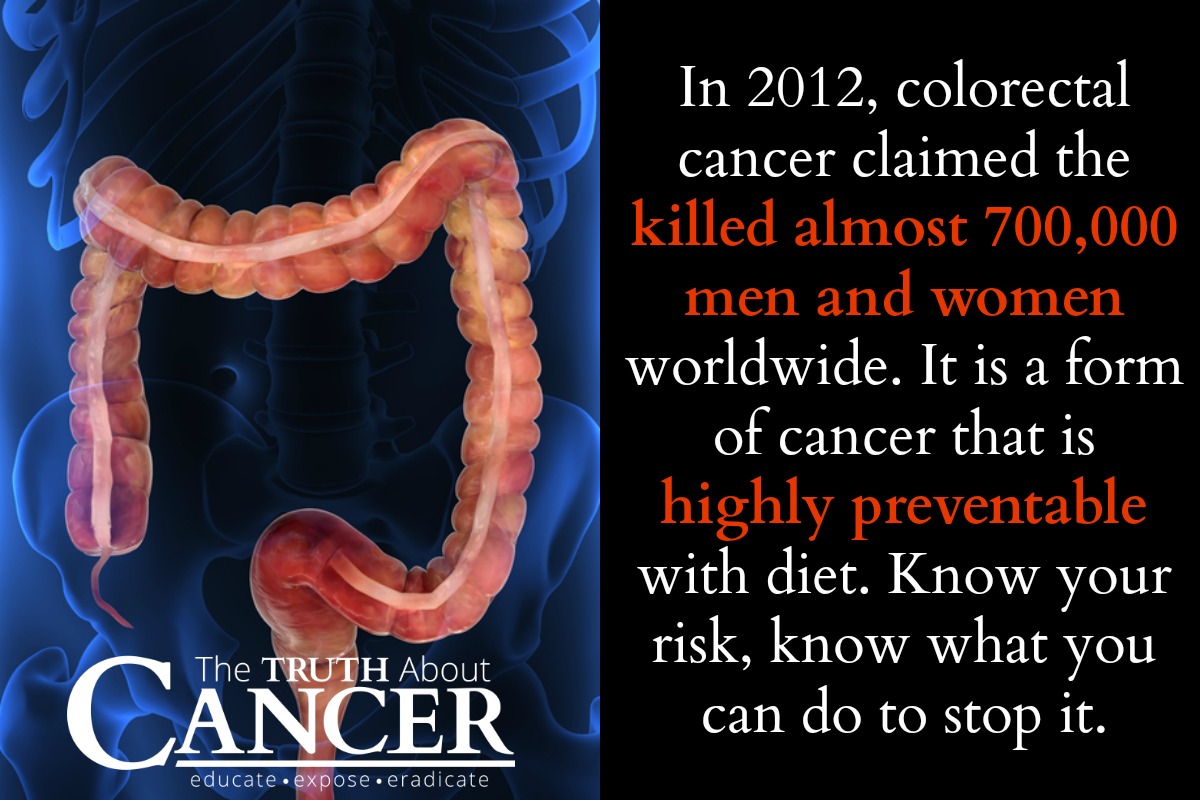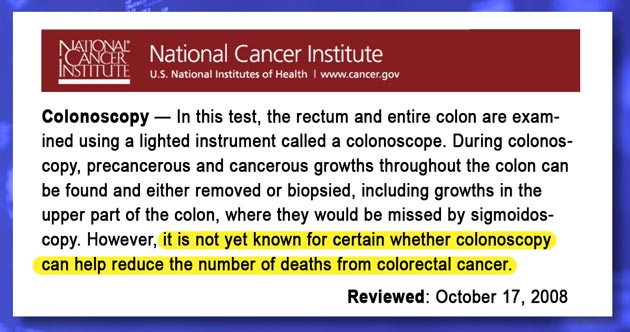Your digestive system plays a critical role in processing nutrients and removing harmful toxins from your body. It’s composed of the large and small intestines, stomach, and esophagus.
The upper portion of the large intestine is referred to as the colon while the lower portions are known as the rectum and anal canal. Cancers of these areas of the body are sometimes referred to jointly colorectal cancers.
Overall, slightly more men than women are diagnosed with colorectal cancers but the lifetime risk is approximately 5% or 1-in-20 people.
Colon cancer occurs when damaged cells develop in colon tissues. These are called polyps and the majority start out benign (non-cancerous). Left untreated, these small clumps may turn cancerous. Several factors increase your chances of contracting colorectal cancers.
Risk Factors for Colon Cancer
- Age – approximately 90% of patients diagnosed are older than age 50
- Common hereditary diseases such as hereditary nonpolyposis colon cancer and familial adenomatous polyposis
- Personal history of adenomatous polyps in the colon or colorectal cancer
- Immediate family history of colon cancer, polyps, or rectal cancer
- History of chronic inflammatory conditions such as ulcerative colitis or Crohn disease
- If you are diabetic or insulin resistant
- Alcohol and tobacco use
- If you are obese, you have a higher risk of contracting colon cancer – as well as a lower chance of survival
- Poor diet of high “bad” fats, high processed carbs, and low fiber
- Lack of exercise
The appearance and severity of symptoms depend on the location and size of the cancer mass. Many patients diagnosed with colon cancer do not experience symptoms at first. Early screening is the most important thing to remember when it comes to treating and beating colon cancer.
Symptoms of Colon Cancer
- Changes in bowel movements, such as constipation or diarrhea
- Bloody stool or bleeding from the rectum
- Unintended weight loss
- Cramps, bloating, and gas pains
- Feeling as if your bowel is never emptied
- Feelings of fatigue or overall weakness
Colorectal cancers are the third most often diagnosed form of cancer for both genders. It is also the secon highest form of cancer that results in death for both genders.
In 2014, experts estimate that more than 135,000 new cases of colorectal cancer will be diagnosed. Of those patients, more than 50,000 are not expected to survive.
This form of cancer is one that patients don’t like to discuss due to embarrassment (due to the area of the body) and fear of the tests done to confirm.
There is no reason to be embarrassed about feeling sick. Hopefully, you have a good relationship with your doctor and will admit to symptoms – no matter where or what they involve.
Common Tests for Colon Cancer
- Colonoscopy and Sigmoidoscopy: This is a procedure in which a tube-like device is inserted to view any abnormal cells. It is also used to take tissue samples. One of the big problems with these types of procedures is that they may actually increase cancer mortality. For instance, the Telemark Polyp Study I demonstrated a 157% increase in mortality among patients who had previously had a colonoscopy. In addition, removing polyps or even doing biopsies releases cancer cells into the bloodstream and the colon’s lumen. In turn, these cells may seed all other cancers throughout the body. An analysis of British data on colon cancer, by the watchdog group Straight Statistics, concluded that screening 1,000 patients for 10 years will prevent two deaths from the disease. Meanwhile, colonoscopies lead to “serious medical complications” in 5 out of every 1,000 patients, according to a 2006 report in the Annals of Internal Medicine. Given these risks, my guess is that a rigorous examination of colonoscopies will find that their benefits do not outweigh their downside. Lastly, the average age for colorectal cancer diagnosis is 72. Commencing invasive screening and polypectomies in asymptomatic people at age 50 is just as absurd as taking contraceptives after menopause.
- Rectal Exam: A gloved and lubricated finger is inserted to check for lumps.
- Fecal Occult Blood Test: Samples of the stool are taken from the patient for laboratory testing to determine if there is blood in the stool.
- Barium Enema: Barium is inserted into the lower intestine to coat all surfaces. Then X-rays are taken to determine the presence of cancer.
Anti-Colon-Cancer Foods
The chief issue that is typically overlooked is how to prevent (and even treat) colon cancer with certain foods. According to the NCI “Fact Sheet on Garlic and Cancer Prevention,” garlic consumption may reduce the risk of developing colon cancer. Protective effects from garlic may arise from its antibacterial properties or from its ability to block the formation and/or halt the activation of cancer-causing substances, enhance repair, reduce cell proliferation, or induce cell death (apoptosis). Garlic is high in the minerals sulfur and selenium as well as plant chemicals such as allicilin and flavonoids, all known to be beneficial to health.
Eating a rainbow of plant antioxidants is another strategy to prevent colon cancer. Foods and herbs like kale, avocado, carrots, blueberries, apricots, cantaloupe, grapes, oregano, ginger, rosemary, turmeric, cabbage, broccoli, and other fruits and vegetables help to decrease inflammation and oxidation while protecting against colon cancer.
Selenium rich foods like brazil nuts, salmon, sunflower seeds, mushrooms, garlic and onions have also been shown to inhibit the growth of cancer cells. Fish oil and other omega-3 oils (EPA and DHA) are very anti-inflammatory and can help prevent the proliferation of cancer cells throughout the body. Numerous studies have shown that several species of ginseng root decrease growth and proliferation of colon cancer cells, cause apoptosis, and act as potent protective anti-cancer anti-oxidant.





















Thank you for this great information! My paternal grandmother died at a fairly young age (when I was only 12) from colon cancer. How I wish this information had been available then. I am a grandmother now & intend to be here for my grandchildren & great gramchildren, LORD-willing! And thanks to you, I have the tools (information) I need to keep my colon & whole body strong & able to fight off/prevent cancer! GOD bless you, Ty, and everyone involved in the quest!
Karin H (Texas)
in Fall of 2012, I was diagnosed with colon cancer @ the age of 44. They found it due to me complaining of muscle fatigue. I was extremely anemic – and when that was discovered, all the testing as to why commenced. I had surgery and 6 months of oral chemo. I had a tumor the size of a hockey puck in my colon… but it was actually a slow growing cancer and it had not broken thru the wall of my colon nor affected any of the surrounding lymph nodes. At my 1st post treatment ct scan- they discovered 4 slightly puffy lymph nodes- and my oncologist said that she was suspicious of them and wanted to do a biopsy. I had just started to read Bill Henderson’s book … which lead me to the belief that they were not puffy due to cancer- but the terrible inflammation producing food I was eating. I told my oncologist I wanted to try something for 90 days -and to have another scan to see my progress. I followed a strict 80% vegetarian diet – as much organic as we could afford… only organic chicken and salmon – only organic grass fed beef once a month, cut out all dairy, sugar, bread & coffee. I lost 30 pds in 3 months, had so much more energy, I was juicing twice a day and I feeling awesome. That next scan showed good results… 3 out of the 4 nodes were back to normal size and my blood work was good. My oncologist was amazed and said to keep up with whatever I was doing. I totally believe that the information that I gleaned from TTAC and Chris Wark has saved my life and continues to give me hope for non-toxic healing and a long life (or however long the Lord grants me)… but I’m doing what I can to be healthy for myself and my family. Thanks Ty for all you do!
My father who was a holocaust survivor was having a colonoscopy after the age of 65 once every six months and they did find polyps but none of them were ever cancerous. Last time the did it it ripped his stomach at the age of 80. Why at the age of 80 would they make him have a colonscopy?! He passed on not from this but from something totally unrealated. This is why my husband and I do not get colonoscopies at all. Thank you for all your amazing work!
Thank you for this amazing info, my father died of this disease. It is so helpful to have all of these tips. God bless you for your heart to share with others. Karin V. Los Angeles, CA
Ive had a recent endoscopy & colonoscopy 21/04/2016 in the UK, I watched him take a piece of the tumour on the TV screen, it wasnt cauterised…and im guessing the tube used passed the tumor on the way in & up & back on the way down & out.
Not a very preventative procedure after all.
Are there any vitamins that we should take daily to prevent or lower the risk of colon cancer? My Mom passed away 3 years ago and she had colon cancer for 7 years, didn’t know about all the better way of healing until 2 years ago when I started reading and looking for more information for myself and brothers to reduce the risk. My Mom did chemoterapy and radiations for a very long time, and I always remember her tired and sick! Wish I knew about all this before and had some more time to help her. I am a breasfeeding Mom now, and concern about which vitamins/Betaglucan etc should I been taken. I am only takin prenatal vitamins…. Any ideas?
Thank you for sharing your story. I have a holistic health practice here in the Boston area and when a client asks me this I tell them a couple of things. Too keep it simple, hydration with clean water or mineral water, juicing lots of greens, little fruit and some ginger, if that is too much for them I suggest the juice plus capsules. Sleep is very important 7-9 restful hours and prayer or medition. Hope this helps! All things are possible, Joan
thank you for sharing ur stories. I was diagnoes with colon cancer stage 3c . last dec.thanks for the info it helps a lot to me !!!!!
I have recently had bloody bowel movements. It also happened about six months ago. It is bright red blood. I am almost 50 years old. I am so turmoiled as to whether to get a colonoscopy or not. When it happened the first time, I had an exam and the doctor said I did not have hemorrhoids and she detected no blood. In my last few years have lived a healthier lifestyle. I eat organic and grass fed meat. Organic vegetables as much as possible. I don’t know how to tell if this is a sign of cancer or not. Can you help advise me please?
Hi Mary,
The best advice we can give you is to consult with one of the doctors/experts that we interviewed in our Global Quest Series. Here is a link to get their information: https://thetruthaboutcancer.com/experts-info-sheet/
A thorough colon cleanse could not hurt. Check out the testimony on pages 44-45 of https://www.herbdoc.com/blog/book/create-powerful-health-5-day-bowel-detox
I never knew that a family history of colon cancer could mean that you have it too. My grandfather and great-grandfather both passed away from colon cancer within the last decade. I will be sure to tell my brother that we need to check ourselves out with doctors to see if there is any colon cancer!